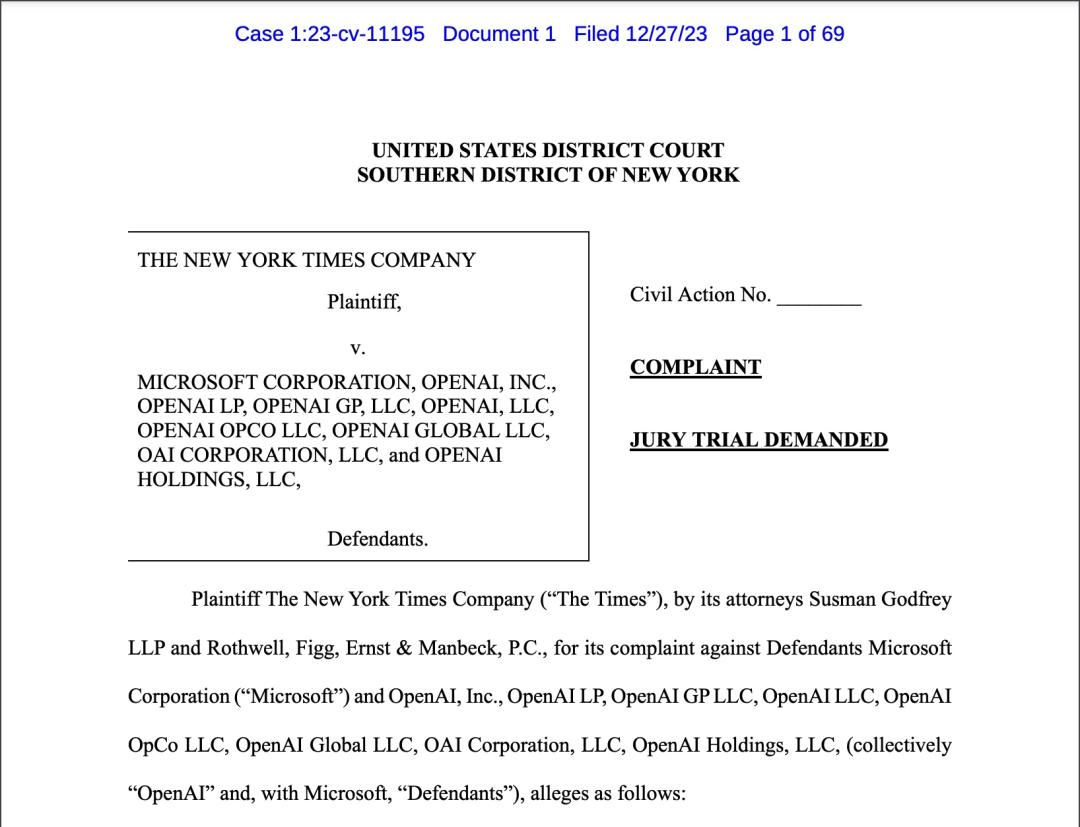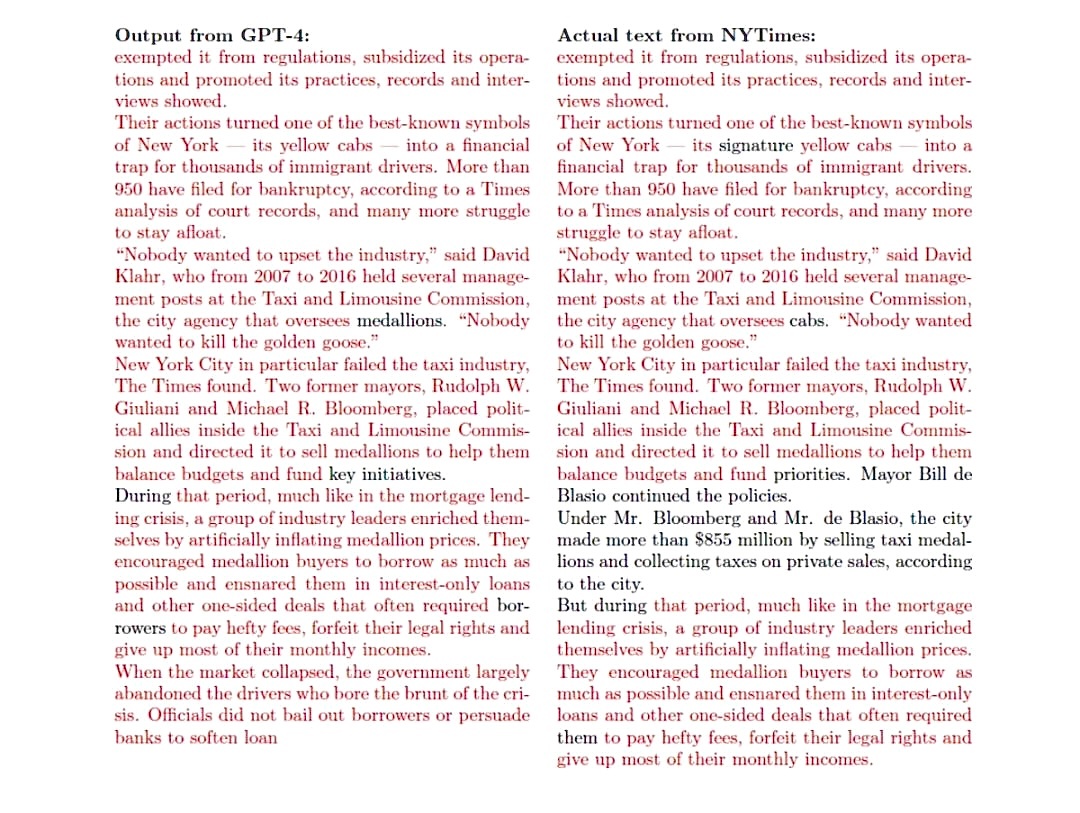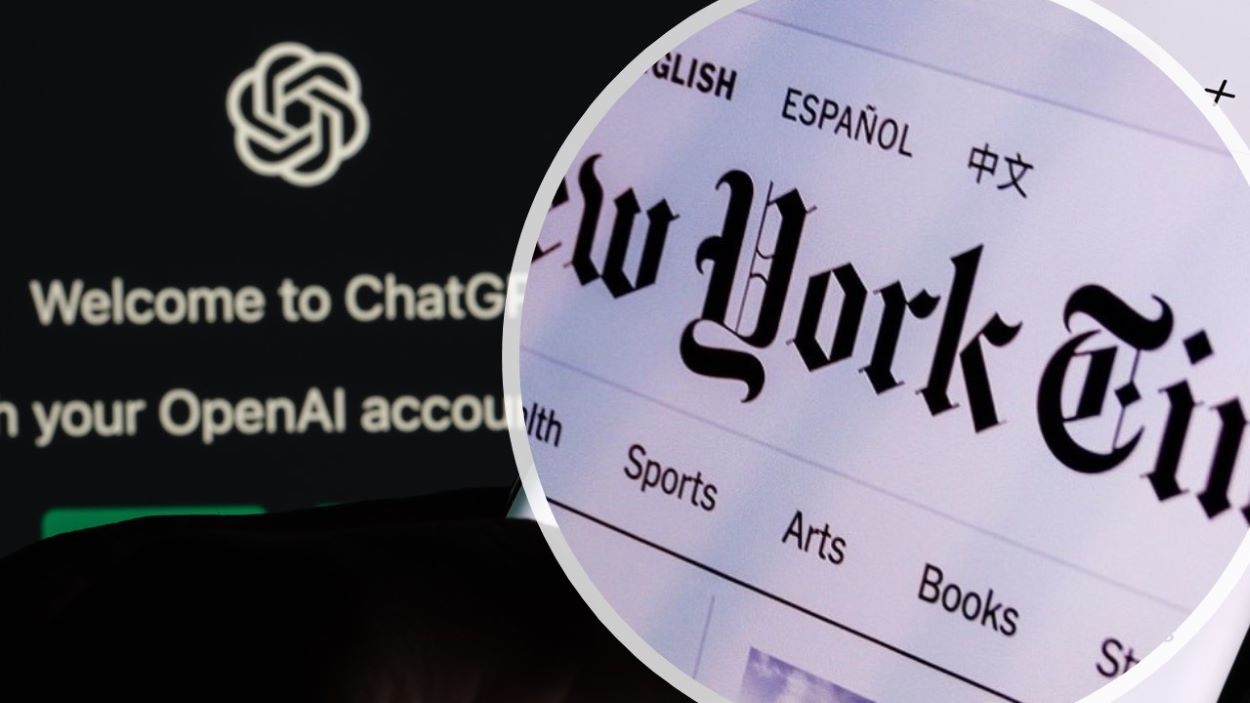First media agency to sue OpenAI and Microsoft?The amount of money involved is over billions of dollars!
The New York Times filed a lawsuit against OpenAI and Microsoft over copyright issues, and the two tech giants may face billions of dollars in sky-high claims。
On December 27, local time, the New York Times filed a lawsuit against OpenAI and Microsoft, becoming the first large media organization to sue OpenAI and Microsoft, and OpenAI and its "gold owner" Microsoft, which are committed to developing artificial intelligence (AI) models and applications, are facing sky-high claims from news giants.。
The lawsuit alleges that the two companies used millions of articles from the media without authorization to train AI chatbots such as ChatGPT and Bing Chat (now called Copilot).。Previously, several writers have also filed lawsuits against it, demanding that AI services be restricted from using its original online content without compensation.。
The big models released by OpenAI include ChatGPT and GPT4, while Microsoft invests in OpenAI and allows it to use Microsoft cloud technology and integrate its technology into Microsoft products.。Currently, investors have valued OpenAI at more than $80 billion.。
The New York Times filed a lawsuit.
The New York Times said that newspapers have invested heavily in journalism, but OpenAI and Microsoft's Large Language Model (LLM) are trying to sit back and generate content of unique value to The New York Times, either intact or in imitation of alternative works.。This infringement reduces reader demand for access to its website, reduces traffic, and has a significant impact on The New York Times' ability to obtain additional revenue from subscriptions, copyright licenses, and advertising.。
Not only that, the use of chatbots for false information makes it difficult for readers to discern facts and fiction, which is not conducive to maintaining a healthy news environment.。

The lawsuit also mentions that The New York Times has been trying to negotiate with OpenAI and Microsoft about its content use since April this year to achieve "a mutually beneficial exchange of value between the defendant and The New York Times."。But now it seems that it can't be negotiated, so the New York Times filed a lawsuit in Manhattan Federal District Court in New York.。
Microsoft and OpenAI have yet to respond in detail, saying only that the training data they collect from the internet is "fair use" and does not constitute infringement under U.S. copyright law.。In a statement, OpenAI said the company "respects the rights of content creators and is committed to working with them to ensure that they benefit from AI technology and new revenue models," and was "surprised and disappointed" by the complaint, given that the two sides are in "constructive negotiations" on copyright issues.。
Tort evidence is conclusive What are the chances of tech giants winning?
In the prosecution documents, The New York Times cites several instances in which OpenAI's ChatGPT and Microsoft's Bing Chat made near-verbatim excerpts of their articles.。OpenAI's ChatGPT-4 featured most of the New York Times articles, including an in-depth report investigating the New York City taxi industry that took 18 months to complete and won a Pulitzer Prize.。

In the image above, the ChatGPT-4 output is on the left, while the original New York Times text is on the right, and the overlapping parts are in red, and the high degree of similarity between them is really eye-catching.。
The New York Times also warned that the "illusion" of AI could cause potential damage to media reputation.。Specifically, the chatbot will insert false information in the answer and attribute it to a certain information source。
For example, 12 of the "15 Most Heart-Healthy Foods" offered by Bing Chat were not mentioned in the New York Times article; ChatGPT-4 also copied the results of Wirecutter, a website owned by The New York Times, but did not link to it, resulting in a sharp drop in Wirecutter's traffic and revenue.。
However, the New York Times is not resistant to the AI industry.。The media said in an emailed statement that Microsoft and OpenAI need to obtain permission to use the work for commercial purposes, and the New York Times has recognized the impact of generative artificial intelligence (GenAI) on the public and the news industry.。
For the case, The New York Times has hired the law firm Susman Godfrey as its chief outside counsel, stating that the defendants are liable for "the illegal copying and use of the unique and valuable work of The New York Times" and the "statutory and actual damages worth billions of dollars" associated with it.。In addition, the two companies should destroy all chatbot models and training data involved in infringement.。
New Front Opens Grey Area of AI and Copyright?
It is understood that before the New York Times sued, many writers and creators had filed lawsuits against some GenAI companies over copyright issues.。
In July, comedian Sarah Silverman and other authors sued OpenAI and Meta Platforms in San Francisco for "stealing" their work; in September, Jodi Picoult and George R..R.Novelists such as Martin sued OpenAI on behalf of the Authors Guild; in November, nonfiction writers also filed class-action lawsuits against OpenAI and Microsoft.。

According to foreign media, the case represents a "constant and chaotic" relationship between AI technology and copyright law.。
Following the emergence of the big model, the industry's legal definition of both sides has been vague.。The move by The New York Times marks a battle between a generation of news giants and GenAI pioneers in the legal space, opening up a new way for technology and media to compete for share of the Internet economy, and will have a profound impact on the publishing industry.。
Today, The New York Times and a growing number of companies and individuals are taking legal action to stop OpenAI from training ChatGPT for infringement.。But there are also mainstream media outlets that have opted to work with OpenAI and have content agreements, such as the Associated Press (AP) and German media giant Axel Springer.。
As for the regulatory level, GenAI regulations have been introduced around the world.。In June of this year, the European Parliament voted to pass the Artificial Intelligence Act (AI Act), which requires disclosure of whether GenAI uses copyrighted materials for training; in December, the European Commission, the European Parliament and representatives of EU member states reached a preliminary agreement on the above bill, which is the world's first comprehensive regulation of AI regulation.。
"If The New York Times and other news organizations fail to produce and protect independent journalism, there will be a huge shock to journalism, a vacuum that neither computers nor AI can fill."。"
·Original
Disclaimer: The views in this article are from the original Creator and do not represent the views or position of Hawk Insight. The content of the article is for reference, communication and learning only, and does not constitute investment advice. If it involves copyright issues, please contact us for deletion.